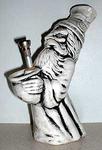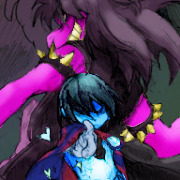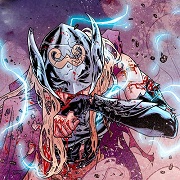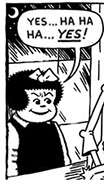|
I will always suggest Retro Phaze as a cool rules lite Dungeon crawler, It's based on games like final fantasy and Dragon quest and it's free
|
|
|
|

|
| # ? Apr 18, 2024 09:33 |
|
Evil Mastermind posted:Here's another blank hexishmap I just remembered I had. Unfortunately I don't remember the source, and Googling for "ggmlk" isn't really helping. I made a forum-fillable version of that PDF (with the creator's permission), it is here.
|
|
|
|
Troll Lord Games is doing a sale right now, 10% off $20 or less, 25% off $21 - $50 and 50% off $51+. If you've got the coupon code from buying their bundle of holding they do seem to stack.
|
|
|
|
DalaranJ posted:No one has answered this yet, so I guess we don't have any chart experts. Here's a cool example of this. Forgotten Realms random encounter tables in 3e specify dragons, either directly on the table or in a subtable. So a given region can have a young green dragon, a very old red dragon, or a juvenile song dragon. Those listings are actually telling you which dragons are active in that area. edit: And adjacent regions often have the some of the same dragons active in them, so forth and so on.
|
|
|
|
Sounds like DCC isn't a downright horrible recommendation that I'd be morally obligated to object to. Thanks everyone.
|
|
|
|
I backed the DCC kickstarter when I was hunting for a "D&D how I remembered it" system as there was realistically no way to get 3-4 of my non-gamer friends to learn 1st ed AD&D. From a few times skimming the PDFs it looks more and more like what I was looking for. It looked like a lot of stuff to process but once I got the hang of how all the charts work it seems like with a handful of printouts it should be an easy system to learn/teach. I do the think the 0 level funnel is going to be a tripping point, so I might try and do a 3-4lvl oneoff to get everyone on board.
|
|
|
|
bongwizzard posted:I backed the DCC kickstarter when I was hunting for a "D&D how I remembered it" system as there was realistically no way to get 3-4 of my non-gamer friends to learn 1st ed AD&D. From a few times skimming the PDFs it looks more and more like what I was looking for. It looked like a lot of stuff to process but once I got the hang of how all the charts work it seems like with a handful of printouts it should be an easy system to learn/teach. I do the think the 0 level funnel is going to be a tripping point, so I might try and do a 3-4lvl oneoff to get everyone on board. Have you checked out the reference booklet here? It's basically all the charts in the core book - I give each player a cut down version of it without the monster stuff. In tangentially related old D&D stuff the Forestry program here is out trimming branches with what I'd classify as saw toothed bills...
|
|
|
|
Dunno if this is the correct thread but... A friend invited me to a 3.5 game, and while I'm very familiar with both Pathfinder and 4e, my experience in 3.5 is much more limited. In Pathfinder, I tend to play a buff heavy summoner with an aggressive Eidolon who focuses on aiding other members of the party. In 4e, I play a bit of everything. Looking at some class options, Artificer, Sword Sage and Bard all seemed cool to me. This will be a more free form and less combat heavy game then I'm used to, are there any really fun builds with those classes? Not necessarily heavily optimised, but ones that for the few combats that do happen, they can do their fun little tricks?
|
|
|
|
Moriatti posted:Dunno if this is the correct thread but... There's a 3.5 thread here
|
|
|
|
Cool, time to cross post, thanks
|
|
|
|
Glorified Scrivener posted:Have you checked out the reference booklet here? It's basically all the charts in the core book - I give each player a cut down version of it without the monster stuff. I had not see that, thanks! I have only looked at little bits of the pdfs, I have been waiting for the books to come out to really dive in. To get my bros into this I am going to need something physical to put under their noses.
|
|
|
|
Scyther posted:Sounds like DCC isn't a downright horrible recommendation that I'd be morally obligated to object to. Thanks everyone. My main objection to DCC is that I feel like its DM support is too barebones, probably because it's leaning on people who are experienced enough with other D&D to do it themselves, and also because there's no expectation that you as the DM will play fair. But if you're willing to pull inspiration from, say, the AD&D 1e DMG, it should work.
|
|
|
|
Alright, I have a bit of a radical hypothetical. What is the benefit of attributes in a retroclone? Why aren't there any (that I know of) retroclones which eschew attributes?
|
|
|
|
DalaranJ posted:Alright, I have a bit of a radical hypothetical. Like, I'm not being (overly) sarcastic. The whole concept of most retroclones is "keep the old rules alive".
|
|
|
|
This is kind of the inherent problem with retroclones: there is fear of too much innovation. This is one reason I actually kind of give props to DCC: it may be a clunky game, but it at least was designed from the perspective of "let's make a game that played how the OSR THINKS games were, not HOW they were." In other words, it tried thinking outside the box. This is also why I like and hate Kevin Crawford. On one hand, he is willing to change what is. On the other hand, he fears changing too much, even if his products would be better if he did. The entire OSR movement would be much improved if it was about taking cool ideas/design philosophies that were forgotten in the old days, examining them, identifying their problems, and trying to make them work. Like, trying to develop as if the last 30 years didn't exist while not, at the same time, fearing innovation: an attempt to make a parallel evolution of game design.
|
|
|
|
I'm not particularly interested in D&D aside from the fact that it happens to have a long and storied history of making games that are (at least supposedly) about a sort of gameplay I am interested in playing or making. So, if one somehow knew about RPGs while simultaneously knowing nothing about D&D and wanted to make a game that was about either fantasy overland travel or underground exploration, then conceivably that game might not have a mechanic similar to attributes? I mean it probably would, because attributes are an extremely easy to come up with and understand gameplay conceit, but it might not? DalaranJ fucked around with this message at 05:40 on Mar 24, 2016 |
|
|
|
There's some value to "having stats, period" insofar as it's an at-a-glance measure of relative power in a particular area of specialization, especially in the case of games that advocate a d20-roll-under-attribute task resolution system There's also some value to "random rolling of stats" as far as providing character idea fodder and quick character creation, provided the numbers are tuned to produce playable characters no matter what. But Evil Mastermind is largely correct that keeping the same six attribute score names, and keeping a 3 to 18 range, and keeping that particular range of attribute modifiers, is really just hidebound traditionalism. Like, even Dungeon Crawl Classics' level-0 character funnel is just a form of AD&D's Method IV ability score generation:  Except you have to go through a Darwinian process of winnowing down the sets you've rolled rather than picking the one that you like best and starting at level 1. Don't get me wrong, that Darwinian adventure can be fun as heck, and it does accomplish the stated goal of preventing CharOp by brute force, but real innovation here is the Luck mechanic and aknowledging that the level-1 OSR adventurer is actually frail as poo poo and you need a small army of them. DalaranJ posted:So, if one somehow knew about RPGs while simultaneously knowing nothing about D&D and wanted to make a game that was about either fantasy overland travel or underground exploration, then conceivably that game might not have a mechanic similar to attributes? You're probably going to have attributes no matter what. Even GURPS as a heavily skill based game still has attributes so that the skills, and the untrained tasks, have a base value to work off of. Even Risus has "attributes", even if they're on the scale of "Big Hulking Bruiser 4" and that could mean an entire panoply of core competencies, but as a core building block of game design, you're going to have them. Might and Magic, Ultima, Diablo, World of Warcraft, Legacy of Grimrock, Final Fantasy, Jagged Alliance, even Out of the Park Baseball all have "attributes" in some form of another. It's just that they don't use D&D's particular way of expressing them.
|
|
|
|
gradenko_2000 posted:There's some value to "having stats, period" insofar as it's an at-a-glance measure of relative power in a particular area of specialization, especially in the case of games that advocate a d20-roll-under-attribute task resolution system These were the main things I was thinking regarding attribute benefits, yes. gradenko_2000 posted:
I would argue that Risus does not have attributes. It might be technically true that everyone in the world has 'Big Hulking Bruiser 0', but I don't think that as a mechanic it's comparable to everyone having 'strength'. In fact, what I was proposing is like WOW (an unfortunately loaded subject), in that, you don't modify your attributes directly, attributes are simply a result of your class and level modified in some ways by your equipment. (I don't have a lot of experience with WOW so, if that's wrong let's pretend that it's true for the sake of argument here).
|
|
|
|
DalaranJ posted:In fact, what I was proposing is like WOW (an unfortunately loaded subject), in that, you don't modify your attributes directly, attributes are simply a result of your class and level modified in some ways by your equipment. (I don't have a lot of experience with WOW so, if that's wrong let's pretend that it's true for the sake of argument here). This is sort of what people mean when they say "Death To Attribute Scores". If there is only one correct answer with regards to what your attribute score distribution should be for any given character type, then might as well automatically award an 18 STR to any Fighter given that that's what they're going to want to do anyway. If there is only one correct answer with regards to how you should be increasing your attribute scores as you level up, then might as well make that automatic. And then, if you want to modify your attribute scores, such as getting more CON if you're tanky or more STR if you're going for big damage, then let the player derive those attribute score increases from bonuses provided by magical items, so that you're not locked-in to a CON-heavy build forever. That's just one possible answer, though - there is another school of thought where you skip ahead to the derived stats provided by attribute scores and automatically increase those: You don't give a Fighter an 18 STR so that they always have a +4 attack bonus, you give them a +4 attack bonus, and that attack bonus increases of its own volition, and that "frees up" the attribute scores to be whatever you like, with whatever in-game rationalization you want for an 18 INT Fighter or an 18 DEX Fighter dealing damage in a narrative appropriate way.
|
|
|
|
gradenko_2000 posted:That's just one possible answer, though - there is another school of thought where you skip ahead to the derived stats provided by attribute scores and automatically increase those: You don't give a Fighter an 18 STR so that they always have a +4 attack bonus, you give them a +4 attack bonus, and that attack bonus increases of its own volition, and that "frees up" the attribute scores to be whatever you like, with whatever in-game rationalization you want for an 18 INT Fighter or an 18 DEX Fighter dealing damage in a narrative appropriate way. This is my preference it seems silly that fighting prowess is usually based on your raw stats in a game where you have experience levels, Experience you gain by fighting and adventuring like to me that should matter way more than stats
|
|
|
|
DalaranJ posted:Why aren't there any (that I know of) retroclones which eschew attributes? Oh, I'm dumb. I have Warrior, Rogue & Mage setting right here in my documents folder. gradenko_2000 posted:This is sort of what people mean when they say "Death To Attribute Scores". I totally forgot that this was a movement, while simultaneously remembering Strike! as a game that didn't have ability scores. Seems to me that old D&D provided less focus on ability scores then later versions. Which is understandable since it wasn't even clear on what it's resolution mechanic was supposed to be outside of combat. That's what got this train of thought rolling.
|
|
|
|
In terms of retro-clone-ish games without ability scores, there's also Barebones Fantasy, which takes the core classes (plus a few more) and turns them into skills. So there are eight skills in all: Cleric, Enchanter, Leader, Scholar, Scout, Spellcaster, Thief, and Warrior. Each one gives "class abilities", some of which scale with the skill level.DalaranJ posted:Seems to me that old D&D provided less focus on ability scores then later versions. Which is understandable since it wasn't even clear on what it's resolution mechanic was supposed to be outside of combat. That's what got this train of thought rolling. Then you go to AD&D, where each stat has its own unique table for what bonuses it provides, which aren't just "apply this value to X, Y, and Z". A 16 STR now means you get +0 to hit, +1 to damage, +350 coins of encumbrance, a 3 in 6 chance to bash open a door, and a 10% chance to bend bars/lift gates. A 16 WIS doesn't give you jack unless you're playing a cleric, in which case it gives a +1 "magical attack adjustment" (which means a -1 to the target's saving throw), one bonus 2nd level spell slot, and a 0% chance of spell failure. Then from there we go to 3e and 4e, where we're back at the idea of each stat just giving a flat bonus from a universal table and applied to X, Y, and Z depending on what stat it is.
|
|
|
|
Elfgames posted:This is my preference it seems silly that fighting prowess is usually based on your raw stats in a game where you have experience levels, Experience you gain by fighting and adventuring like to me that should matter way more than stats I always imagine old D&D being played in large groups of 6+ people. As I progressed in AD&D both as a player and DM, it became the norm to have henchmen that go into dungeons and men-at-arms that guard the horses outside. Players buying guard and war dogs at level 1 wasn't unheared of because it was a way to have some extra security or extra attack dice. Having characters with pedestrain stats was also the norm, roll 3d6 reroll 1s. By 3e players wanted more and more, it became common for people to roll 4d6 reroll 1s (and sometiems 2s!). And of course 4e to me seems very stat dependent. I think this came about for a couple of reasons. AD&D it was pretty simple to run animal compains and level-0 men-at-arms. 3e made things harder. So if the players increased in power enough to not need henchmen, all the better. And by 4e I wouldn't want to have to manage henchmen as a DM or player. Having good stats means you do not need extra helpers. Have good stats helps new players achieve things faster. Want to kill the Goblin King? Got 18 STR and are going to punish him with damage bonuses, good that works. But as Elfgame says, a smart player could probably get that Goblin King off'ed in several ways using say a clever ruse. Having good stats means that things get accomplished easier. I played a Face-type character in Shadowrun for a campaign and it annoyed the hell out of the min-max Street Samurai. He got his kicks splatting trolls and cybered up gizzards while I got my kicks out of conning NPCs, negotiating better prices, and being able mess with the Game Masters plans. Stats and gear can definitely make the player and I bet we all have stories of a character with a certain item or combination of something that was super awesome. But I am sure there are equal if not more stories of players using the enviroment, some over looked mundane item, or using a skill in a weird way that totally saved the party or moved the story into some strange but better place. I really liked how Evil Mastermind pointed out of cool it was in AD&D that every stat was different. And to an extent so where magic items in AD&D. Magic items on a template just tells the player that there are better things down the line.
|
|
|
|
Evil Mastermind posted:In terms of retro-clone-ish games without ability scores, there's also Barebones Fantasy, which takes the core classes (plus a few more) and turns them into skills. So there are eight skills in all: Cleric, Enchanter, Leader, Scholar, Scout, Spellcaster, Thief, and Warrior. Each one gives "class abilities", some of which scale with the skill level. So, from OD&D where have the abilities do nothing (mechanically, there's still the narrative benefit to keep in mind) except modify your experience result. To AD&D where every attribute was doing 3 to 6 different things. 3rd+ editions are really sort of 'in the middle'. Which is certainly the result of having a solid core mechanic for actions. I wish I knew more about the 2nd edition era to know if some of AD&D's excesses directly inspired future mechanical changes. In any case, recalling the popularity of DTAS around here I certainly think that no one would object to me trying a retroclone (or anti-retroclone) where I removed attributes.
|
|
|
|
The complicated AD&D bonuses were actually from OD&D, they were introduced in it's first supplement, Greyhawk. OD&D with all supplements looks a lot more like AD&D than it does what Basic became.
|
|
|
|
Evil Mastermind posted:Then you go to AD&D, where each stat has its own unique table for what bonuses it provides, which aren't just "apply this value to X, Y, and Z". A 16 STR now means you get +0 to hit, +1 to damage, +350 coins of encumbrance, a 3 in 6 chance to bash open a door, and a 10% chance to bend bars/lift gates. A 16 WIS doesn't give you jack unless you're playing a cleric, in which case it gives a +1 "magical attack adjustment" (which means a -1 to the target's saving throw), one bonus 2nd level spell slot, and a 0% chance of spell failure.
|
|
|
|
DalaranJ posted:Seems to me that old D&D provided less focus on ability scores then later versions. Which is understandable since it wasn't even clear on what it's resolution mechanic was supposed to be outside of combat. That's what got this train of thought rolling. You're correct that OD&D didn't really care all that much about ability scores: a high STR didn't do anything except score you more XP. Your to-hit rate was ok even if you didn't have any ability modifiers, and being able to hit higher-level enemies consistently was more about getting to high-level than anything else (in a sense, this does mean that getting the XP bonus from having a high prime requisite was good, but in a roundabout, less-direct way than what we'd see later on) Greyhawk starts adding explicit ability score modifiers, and so does BECMI, but since the combat system still uses the original OD&D attack tables, the value of the ability scores is still de-emphasized: it's explicitly a bonus. A 10 STR Fighter in OD&D, or in OD&D+Greyhawk, or in Basic D&D still has a 55% chance to hit an Unarmored target. AD&D actually still does use the same attack tables, so the point remains largely the same, except there's enough other stuff bolted onto the stats like Bend Bars/Lift Gates and spell learning limits that you actually want high ability scores, which is good because AD&D is when Gygax starts telling people to stop doing 3d6-in-order. It's in WOTC-era D&D where you start seeing high ability scores start becoming mandatory for basic competence: A CR 1/4 Kobold has an AC of 15. If you're a Fighter and you try attacking that thing with a d20 +1 BAB, and nothing else because you only have 10 STR, you have a 35% chance of hitting. This is compared to a 45% chance to hit a TSR-era Kobold with 7 AC DalaranJ posted:I wish I knew more about the 2nd edition era to know if some of AD&D's excesses directly inspired future mechanical changes. Not directly related to our ability scores discussion, but you can draw a pretty clear line between the revised combat rules in AD&D 2e's Combat and Tactics sourcebook and 3rd Edition's combat. This is when the combat round got reduced to 6-10 seconds, we got crit confirmations, 5-foot squares, 5-foot steps, flanking rules, prone rules, trip attacks, and dividing actions into fractions of what you can do in a turn that resemble the Move/Standard/Full-Round division (compared to AD&D 1e's segmented action) gradenko_2000 fucked around with this message at 07:23 on Mar 25, 2016 |
|
|
|
I always thought it would be cool if your stats informed more of your secondary bonuses so if you had a strength +2 or whatever maybe some abilities do 2 more damage or you can push a dude 2 squares and give every class a framework where they can use most if not every stat.
|
|
|
|
Payndz posted:I'm so used to Basic's standardised-ish ability score bonuses that I forget AD&D didn't do things the same way, inevitably making things that bit harder for the players. As if adding AC10 to the hit matrix making all attacks against a particular AC 5% harder wasn't bad enough, even STR 16 giving you +0 to-hit rather than +2 means even more chances for "Roll to hit! You miss. Next player...", which to me was the single most boring and frustrating thing about playing D&D. It's the reason why my current retroclone project does away with to-hit rolls entirely; if you make an attack you're always going to do some damage, the question is how much. Don't forget too that in AD&D, if your stat wasn't at least a 16 you probably weren't going to get a bonus of any kind. 16 STR was the first point where you get a damage bonus (max STR for a female elf), STR 17 was the first point where you got an attack bonus. INT only got you extra languages if you weren't a magic-user, but if you were INT 8 or higher you got at least one extra language. If you were a magic-user, then INT determined your percent chance to be able to learn a spell (one roll per spell period) and the minimum and maximum spells you could know. You needed INT 19 to be able to potentially learn every spell there is. WIS doesn't give a bonus until WIS 15, which gives a whopping +1 "magical attack adjustment", which is actually a penalty to the target's saves. Lower WIS means a percent chance of your spells just failing to go off, with a 13 needed for the 0% chance and some extra spell slots. Oh, and if you're not a cleric or divine caster then WIS doesn't do jack poo poo for you. DEX 15 is the first point where you get a bonus (to AC), DEX 16 starts giving a bonus to surprise checks and missile attacks. DEX 16 is also the point where you get bonuses to thieving abilities; at DEX 16 you get a whole +5% to Open Locks! CON doesn't give an HP bonus until CON 15 (+1 hp/level, whoopdiedo), and also determines your percent chances of being able to be resurrected or surviving "system shocks". Even at a CON 16 they hover around 90%. CHA gives you you maximum number of possible henchmen (remember those?), modified their base loyalty, and gave a boost to NPC reactions. Again, you need a 15 or better to get a worthwhile bonus; you get bonuses at CHA 13, but it's a piddly 5%. When 3e came out, the idea that you didn't need to have stats of 15 or better to get some sort of bonus from them was a really big deal.
|
|
|
|
The newest Bundle of Holding is for Hackmaster 5th Edition. Forums poster hyphz did a review of it here. It's no longer the knock-off AD&D that HackMaster 4th Edition was, and is mostly its own game save its continued use of the d20 and the 6 core attributes (plus Luck), but it reads like a well-designed game, with a neat pseudo-real-time combat system. Something like a more mechanically dense Dungeon Crawl Classics.
|
|
|
|
Anyone else get something really heavy in the mail today?  
|
|
|
|
So, I did all that Not exactly my style but it certainly fits the criteria.
|
|
|
|
DalaranJ posted:So, I did all that Yeah SOTU (of which I did an F&F review here!) does that "let's just give you the derived attributes that you might expect had you actually done what you're supposed to" approach to Death To Attribute Scores, and it works pretty well for it.
|
|
|
|
Evil Mastermind posted:WIS doesn't give a bonus until WIS 15, which gives a whopping +1 "magical attack adjustment", which is actually a penalty to the target's saves.
|
|
|
|
FRINGE posted:In 2e gives a bonus to your saves against certain "mind magics" and illusions. It was called "Magical Defense Adjustment" and had effects beyond 18. (It slowly made you immune to certain enchantment/illusion-like spells as the chart climbs past 18. I.e. Command, Hold Person, Suggestion, etc) It's a bonus to your own saves in 1e as well. It's just worded awkwardly because Gygax.
|
|
|
|
Does anyone know of any good room-by-room dungeon generators that you roll by hand, like Gygax's in the Strategic Review #1/DMG 1e? Gygax's is great, but I'm curious to see what results you get with a different system.
|
|
|
|
Castles and Crusades has Engineering Dungeons. I cant really say anything about its quality. http://www.amazon.com/Engineering-Dungeons-Castles-Crusades-Robert/dp/1929474997
|
|
|
|
The 5e DMG has one as well, though it may have been lifted directly from the 1e DMG.
|
|
|
|
Found another one in the 2e Dungeon Builder's Handbook, so that would be 4. Would people be interested if I worked up an example of each of these and compared them somewhere?
|
|
|
|

|
| # ? Apr 18, 2024 09:33 |
|
Arivia posted:Found another one in the 2e Dungeon Builder's Handbook, so that would be 4. Would people be interested if I worked up an example of each of these and compared them somewhere? Very!
|
|
|



















